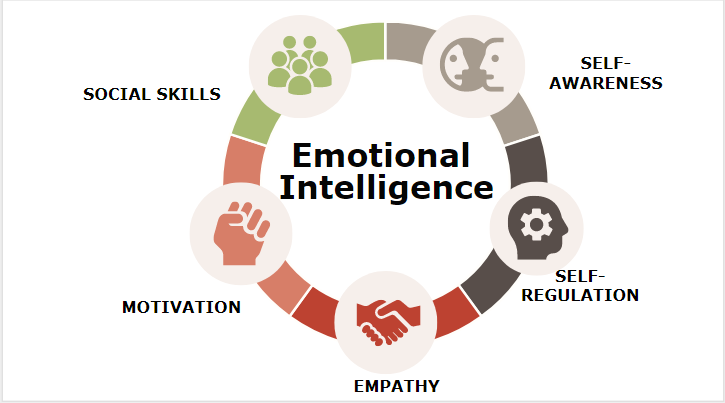Career Trends: October 12, 2022
Curated by the Knowledge Team of ICS Career GPS

Content Credit:
- Article by Goldie Chan, published on forbes.com. Original article link.
Emotional intelligence (EQ) is the ability to understand our own emotions and the emotions of others. Psychologist Daniel Goleman coined the term in 1995 in his ground-breaking bestselling book, ‘Emotional Intelligence: Why it Can Matter More Than IQ.’ Since then, many studies have discovered that EQ is the most important quality for effective leadership.
An emotionally intelligent person not only knows how to manage their emotions, but they are aware of how their emotions affect others and therefore act accordingly when in a social setting. According to Goleman, emotional intelligence is made up of five key components:
- Self-awareness
- Empathy
- Motivation
- Social skills
- Self-regulation
The better you are at managing these areas, the more emotionally intelligent you will become. Here are some ways emotional intelligence can make you a better leader:
1) Better Self-Awareness
- It is difficult to understand the people around you when you don’t understand yourself.
- Goleman argues that self-awareness is one of the most important elements of emotional intelligence because it gives you the ability to tune into your emotions.
- You value yourself and are clear about your personal strengths and weaknesses.
- And when you value yourself, you also value others.
2) Lead With Empathy
- If you want to get the most out of your team, lead with empathy.
- Empathetic leaders are capable of evaluating a situation from someone else’s point of view.
- They have the ability to feel the emotions of others, which in turn makes them feel understood.
- Most people don’t like bringing their problems to work.
- But because empathetic people can tune into the emotions of others, they do not pay attention to simply what is said.
- They pay attention to the energy of the person’s emotions and continue the conversation based on what they sense the individual is feeling.
3) Increased Motivation
- Emotionally intelligent people have the ability to motivate themselves.
- They have a strong personal drive that makes them committed to achieving their goals and improving themselves.
- They are optimistic and resilient and see obstacles as opportunities instead of hindrances.
- This motivation rubs off on their team and employees are more inclined to work to the best of their ability.
4) Better Social Skills
- One of the most important elements of social skills is effective communication.
- It is an essential trait in leadership because they need to know how to communicate the vision and strategy in a way that excites and motivates others to turn it into a reality.
- Additionally, there are a variety of personality types in the workplace and a good manager must be able to adapt their communication style to suit individual personalities.
5) Better Self-Regulation
- Self-regulated individuals don’t make decisions based on their emotions.
- They are very rational, calm and measured; they think before they speak and maintain a high level of self-control at all times.
- A stressed-out leader equals a stressed-out workforce.
- When leaders are unable to manage their stress effectively, it has a trickle-down effect.
- Stress in the workplace is inevitable, but how it’s managed will determine whether it works for or against you.
If you feel you need to improve your emotional intelligence skills, there are several methods you can do to achieve this.
You can start by practicing mindfulness to get a better understanding of your feelings so that you can take control of your emotions, this will enable them to work for you and not against you. Additionally, you can work on your self-confidence. Practicing mindfulness will also help you tap into the areas that you know you need to work on. As you make a conscious decision to work on your weaknesses, your confidence levels will increase, and so will your emotional intelligence.
…
Have you checked out yesterday’s blog yet?
How to answer “Tell me about yourself” questions at an interview
(Disclaimer: The opinions expressed in the article mentioned above are those of the author(s). They do not purport to reflect the opinions or views of ICS Career GPS or its staff.)




One Reply to “How Emotional Intelligence Helps You Become A Better Leader”